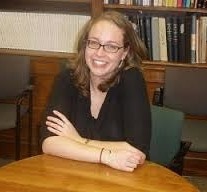 Doctoral dissertations must offer original contributions to knowledge and understanding. For historians this involves not only identifying fresh topics and source materials but exercising the diligence and imagination to reconstruct past lives and circumstances from necessarily fragmentary evidence. Their reward is to uncover unknown or forgotten aspects of the past, or to offer new and surprising perspectives on familiar subjects.
Doctoral dissertations must offer original contributions to knowledge and understanding. For historians this involves not only identifying fresh topics and source materials but exercising the diligence and imagination to reconstruct past lives and circumstances from necessarily fragmentary evidence. Their reward is to uncover unknown or forgotten aspects of the past, or to offer new and surprising perspectives on familiar subjects.
This past May, four scholars were awarded PhDs by the History Department, a number that should make a small liberal arts department very proud.
Two of these graduate students shed light on a pair of women who broke tradition and forged new paths personally and politically, another focused on the revelations of character and piety in the diary of an 18th century Congregational minister who despite inner doubts, brought peace to his flock. The dissertation of the fourth student examines the political, economic and cultural relationship between the United States and a region of Southern Italy over several centuries.
In her dissertation titled, “Janet Minot Sedgwick II and the World of American Catholic Converts,  1820-1890,” Erin Bartram traces the history of the controversial conversion to Catholicism of Sedgwick. Raised by an elite New England Unitarian family. Sedgwick, who was born in New York City, found friendship and emotional support through her association with other female converts. Despite her family’s indifference (they eventually accepted her conversion) and what Bartram said were priests whose ideas “about gender and authority” conflicted with her own, Sedgwick found happiness and comfort with other converts and eventually worked to establish a Catholic school.
1820-1890,” Erin Bartram traces the history of the controversial conversion to Catholicism of Sedgwick. Raised by an elite New England Unitarian family. Sedgwick, who was born in New York City, found friendship and emotional support through her association with other female converts. Despite her family’s indifference (they eventually accepted her conversion) and what Bartram said were priests whose ideas “about gender and authority” conflicted with her own, Sedgwick found happiness and comfort with other converts and eventually worked to establish a Catholic school.
 The woman studied by graduate student Allison B. Horrocks had a different, though equally groundbreaking life. Flemmie Kittrell (1904-1980) was a pioneer in the effort to establish the legitimacy of the study of home economics. The first African American woman to earn a PhD in that field, Kittrell taught the subject at many black institutions. But her work, according to Horrocks’ research, did not begin and end on college campuses. Kittrell developed home economics programs abroad. As the dissertation, titled “”Good Will Ambassador with a Cookbook,” points out, because of Kittrell’s accomplishments, her work should be viewed as providing a new understanding of women’s activism, gender politics and the legitimacy of the field of home economics in higher education and politics.
The woman studied by graduate student Allison B. Horrocks had a different, though equally groundbreaking life. Flemmie Kittrell (1904-1980) was a pioneer in the effort to establish the legitimacy of the study of home economics. The first African American woman to earn a PhD in that field, Kittrell taught the subject at many black institutions. But her work, according to Horrocks’ research, did not begin and end on college campuses. Kittrell developed home economics programs abroad. As the dissertation, titled “”Good Will Ambassador with a Cookbook,” points out, because of Kittrell’s accomplishments, her work should be viewed as providing a new understanding of women’s activism, gender politics and the legitimacy of the field of home economics in higher education and politics.
Anthony Antonucci’s dissertation examines the evolution of the relationship between the Mezzogiorno region of southern Italy (centered around the city of Naples) and the United State, dating back to 1785 when Thomas Jefferson was U.S. Minister to France, through author Herman Melville’s visit to Italy in 1857, six years after the publication of “Moby Dick.” The exchange of goods and ideas between the two regions “exerted a substantive influence on the economic and cultural development of both countries,” he writes of his thesis titled in part, “Americans and the Mezzogiorno: United States Relations with the Kingdom of the Two Sicilies.” Though largely overlooked, the examination of how Americans and southern Italians viewed and related to each other “offers a larger understanding of both cultures” of the late 18th and 19th centuries.
The depth and breadth of historical research becomes even clearer when one considers the dissertation  of Linda Meditz who chose to do a close examination of the life of Stephen Williams, through his own words. Titled “Captive: Piety and Ministry in the Diary and Life of Stephen Williams,” Meditz provides a close reading and analysis of Williams’ 4,000 page diary, which starts in1715 when he had just graduated from Harvard and ends in 1782, a week prior to his death. Though other scholars have concentrated on Williams’ comments on events of the period, Meditz focuses on the personal aspects of his inner piety and his belief that he was inadequate for the spiritual life. The diary, which Meditz calls “a hybrid literary form,” because of its mix of styles and materials, served as a “spiritual discipline,” through which the pastor looked into his soul and dealt with his self-doubts.
of Linda Meditz who chose to do a close examination of the life of Stephen Williams, through his own words. Titled “Captive: Piety and Ministry in the Diary and Life of Stephen Williams,” Meditz provides a close reading and analysis of Williams’ 4,000 page diary, which starts in1715 when he had just graduated from Harvard and ends in 1782, a week prior to his death. Though other scholars have concentrated on Williams’ comments on events of the period, Meditz focuses on the personal aspects of his inner piety and his belief that he was inadequate for the spiritual life. The diary, which Meditz calls “a hybrid literary form,” because of its mix of styles and materials, served as a “spiritual discipline,” through which the pastor looked into his soul and dealt with his self-doubts.
So there you have it: Four commendable scholarly works that take readers from international cities to the innermost workings of an individual’s soul. The results represent years of study, research, writing and rewriting by the four new PhDs, who have brought pride to their department and faculty mentors, and enlightenment to the field of history.
by Terese Karmel
Department of Journalism